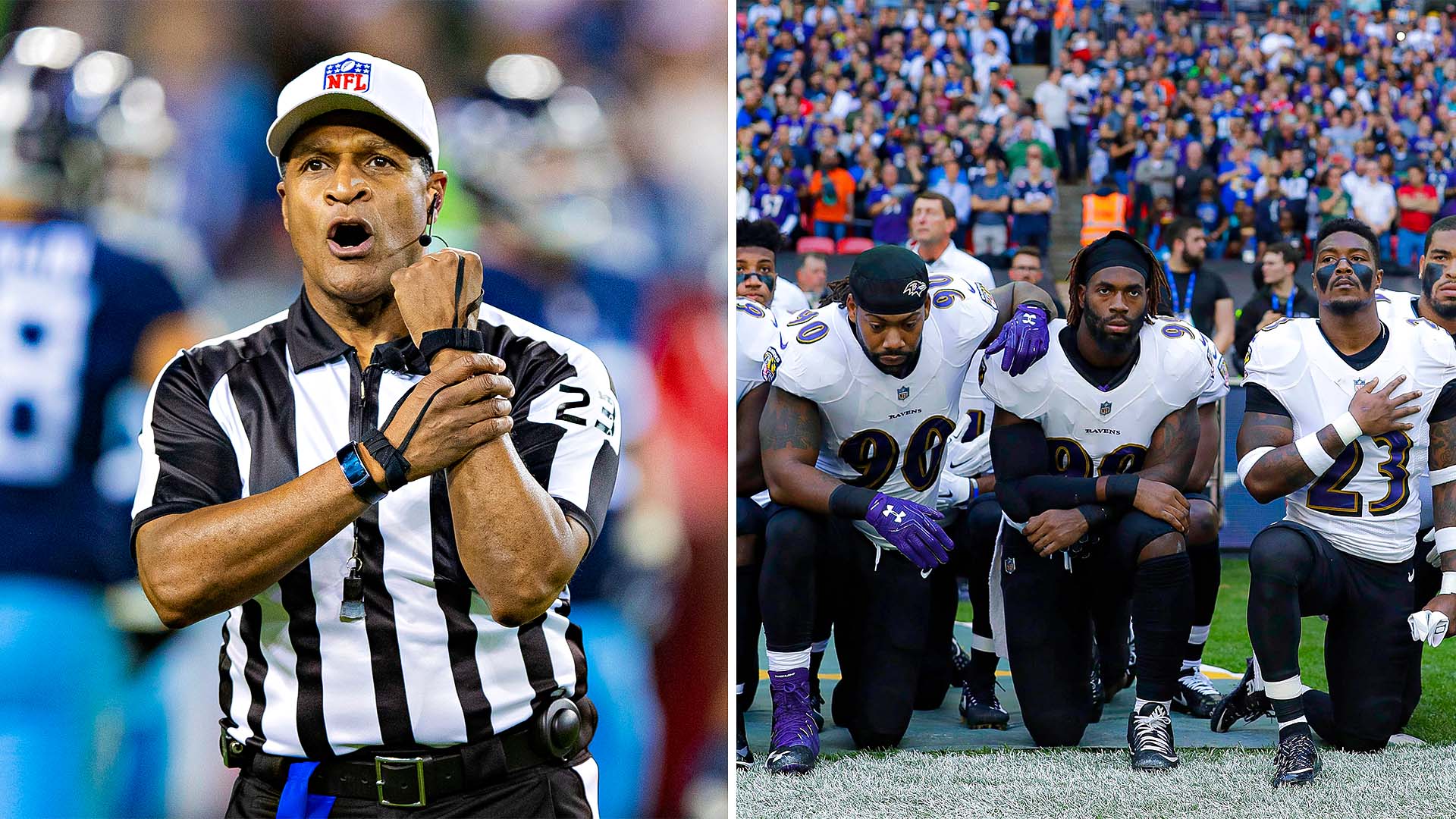In a stunning turn of events, the NFL witnessed an unprecedented display of authority during a recent game. Four players, known for their activism and symbolic protests during the national anthem, found themselves at the mercy of zealous referees who seemed to have taken their duties a tad too seriously.
It all began with the customary pre-game rituals. The stadium was brimming with anticipation, fans buzzing with excitement as they awaited the kickoff. The players, donned in their team colors, stood lined up along the sidelines. The time had come for the national anthem to echo through the stadium.
As the first notes reverberated, something extraordinary happened. Four players, in unison, dropped to one knee. It was a gesture familiar to those following the league closely—a silent protest against social injustices and racial inequality. However, what followed was anything but expected.
The referees, clad in their black and white stripes, appeared to take immediate offense. With a swift and decisive hand gesture, they signaled towards the players, their expressions stern and unwavering. The crowd watched in disbelief as the referees approached the kneeling players, their movements purposeful and resolute.
What’s going on? murmured the spectators, their confusion palpable. Little did they know, they were about to witness a spectacle that would defy logic and reason.
The referees, seemingly possessed by an inexplicable sense of authority, proceeded to issue ejection notices to each of the kneeling players. Yes, you read that right—ejection notices. As if in a bizarre parody of justice, the players were summarily dismissed from the game for the audacious act of kneeling during the national anthem.
Pandemonium ensued. Fans erupted into a cacophony of boos and jeers, incredulous at the referees’ brazen display of power. Social media platforms buzzed with disbelief, memes flooding timelines faster than a flea-flicker play. It was a moment that would go down in NFL history, albeit for all the wrong reasons.
In the midst of the chaos, the league issued a statement, attempting to quell the growing outrage. The NFL upholds the values of freedom of expression and respects the rights of players to peacefully protest,” the statement read. “However, in this instance, the referees acted independently, and their actions do not reflect the views or policies of the league.
But try telling that to the fans, who saw the ejections as nothing short of a farce—a slap in the face to the very principles of freedom and democracy the national anthem purportedly symbolized.
As the game continued, albeit overshadowed by the controversy, the ejected players found themselves thrust into the spotlight once again. Interviews and press conferences awaited them, their every word scrutinized and analyzed by pundits and armchair quarterbacks alike.
It’s not about the anthem itself, one of the players remarked in a post-game interview. It’s about the issues it represents—the systemic injustices that continue to plague our society. And if kneeling during the anthem starts a conversation, then it’s a conversation worth having.
His words resonated with many, sparking a renewed debate on the role of athletes in social activism. Some praised the players for their courage and conviction, while others condemned them for what they saw as a disrespectful gesture towards the flag and the nation.
But amidst the noise and controversy, one thing became abundantly clear—the power dynamics within the NFL were shifting. No longer were players content to remain silent on the sidelines, their voices drowned out by the roar of the crowd. Instead, they were using their platform to speak out, to challenge the status quo, and to demand change.
As the sun set on the stadium and the final whistle blew, one couldn’t help but wonder—what would the future hold for the NFL and its players? Would the referees think twice before wielding their authority so indiscriminately? Only time would tell.
But for now, the image of four players kneeling during the national anthem, and the referees ejecting them in a misguided attempt to silence their protest, would linger in the minds of fans everywhere—a stark reminder that sometimes, the most powerful statements are made in silence.
The fallout from the Great Ejection reverberated far beyond the confines of the stadium. It sparked a national dialogue on the intersection of sports, politics, and activism, with pundits, politicians, and everyday citizens weighing in on the controversy.
